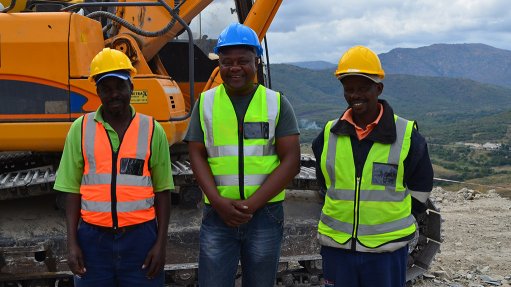
SYMBIOTIC RELATIONSHIP The sharing of knowledge and experience would prove invaluable to black-owned companies and, ultimately, benefit all the businesses in the mining sector
Materials handling and alternative mining solutions expert Ncamiso Mining is expanding its presence in Welkom, where it sees strong potential to grow and support local black-owned and black economic-empowerment (BEE) entities across the various needs of the company’s operations in the area.
However, unlike Ncamiso, large mining majors are not as eager to deal with BEE suppliers, owing to their lack of confidence in the abilities of black-owned and -managed companies, says Ncamiso Mining MD Fikile Mashinini.
He notes that established mining companies’ reluctance to give black-owned suppliers the benefit of the doubt is the main deterrent to black-owned supplier development and growth.
“The Mining Charter requires BEE through mandating a certain level of black procurement and enterprise development, but, in reality, black-owned businesses lack the experience and, sometimes, the requisite skills to endear them to the bigger industry players,” says Mashinini, adding that “therein lies the conundrum”.
The new charter, gazetted last month, requires 30% black ownership and specifies that this ownership be split between black entrepreneurs, employees and communities. It also stipulates that mining companies source 70% of goods be from BEE entities, that 80% of services be performed by BEE entities and 100% of all mineral samples be analysed by locally based firms.
Mashinini feels that these targets are currently unrealistic, owing to the current lack in skills and training among black-owned businesses that need to adequately deliver the products and execute the services, with the Chamber of Mines (CoM) having called these targets “unattainable” and “unsustainable”.
Supplier-Specific Skills Development
He notes, however, that despite disagreements pertaining to targets, black-owned businesses need the industry experience and knowledge that the larger mining houses could provide, stressing that there is currently little investment in the education and development of these black-owned businesses. Social labour plans prioritise investment in communities and aim to provide skills training for employees but often neglect investing in the black-owned businesses operating within these communities and the mining sector.
“Large mining companies should work together with smaller black-owned companies to provide or facilitate skills training while supporting the development structure of these businesses,” states Mashinini. He notes that this sharing of knowledge and experience would subsequently prove invaluable to black-owned companies and, ultimately, benefit all the businesses in the South African mining sector.
This initiative would also boost supplier development while allowing for more attainable compliance with the empowerment targets set out in the Mining Charter. “Further, it builds credibility and the capability of delivering trustworthy, reliable and adequate services.”
Mashinini notes that the current dispute between the Department of Mineral Resources (DMR) and the CoM is “very unfortunate”. He agrees that there has been a lack of consultation between all stakeholders and vested interests but notes that the chamber’s resolve in obtaining an urgent interdict on the implementation of the charter is detrimental.
“The reality is that, if the chamber proceeds with the current legal action, it will likely result in long, protracted litigation which doesn’t benefit anyone and can only be detrimental to the mining industry in that it drives uncertainty. When there is uncertainty, it affects the financial market, deters investors and impacts on supplier development and employment,” Mashinini opines.
He adds that this would be especially detrimental to black-owned enterprises and suppliers which – while facing the same pressures as other industry stakeholders such as a lacklustre economy – have the added barrier of a lack of confidence in their abilities. Rather, Mashinini stressed that the better way forward for all parties would be for the DMR, CoM and all South Africa’s mining industry players and stakeholders to communicate and address the concerns and issues together to find a sustainable solution.
Mashinini notes that Ncamiso is passionate about supporting other black-owned businesses and, where possible, specifically aids those that are based within the greater communities in which it operates: “We pride ourselves on our engagement with the local community of each operation.”
He notes that the level of engagement varies based on the various service offerings that the immediate community can offer, but notes that, on average, Ncamiso outsources at least 75% of its services to black-owned local businesses in such areas as earthmoving equipment, screening and crushing machines/plants, security, trucks and energy resources.
“Ncamsio also employs local community members to assist in reef picking and other work to try and alleviate unemployment and crime in communities.” Mashinini emphasises that Ncamiso aims to “practice what we preach” and believes firmly in sharing business knowledge to balance out the skills divide that hinders black-owned companies from acquiring the trust of the bigger mining houses.
Skills Development
Over the past year, the DMR has facilitated training of Ncamiso staff in basic safety, first aid, blasting, earthmoving and administration through State-owned mining research company Mintek, Mashinini notes, adding that senior management training, which is now filtering down to all Ncamiso’s hard-labour and contract staff, enjoyed particular focus.
He notes that the company is training seven staff through occupational health and safety solutions provider NOSA. These courses cover mining health and safety, environmental management, project management, payroll, South African Revenue Service returns and human resources. He points out that training and skills development is “exceptionally important” to Ncamiso.
Consistent skills development is particularly necessary in the mining industry, as it is constantly growing and changing, with companies subsequently having to ensure that they keep up with trends to remain competitive, Mashinini highlights.
Ncamiso is rated on an exempted microenterprise scorecard as a Level 3 broad-based BEE contributor, with 110% procurement recognition and between 75 and 84.99 BEE points. “As a business, our current focus is on sustainable development and training, and increasing the skills set of our staff is an integral part of that.”